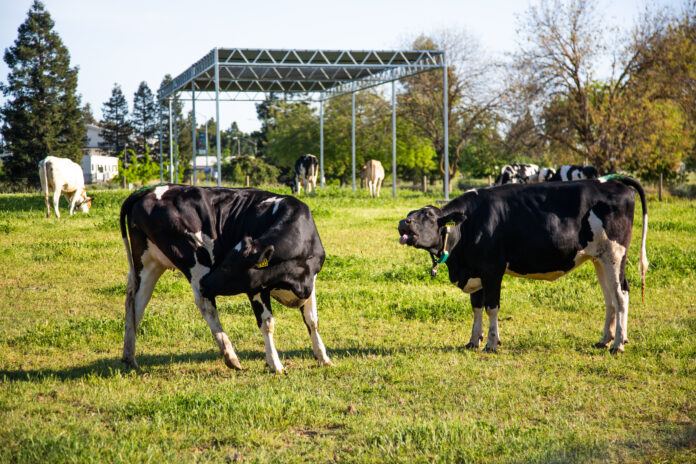Spring Quarter is a time of new life for animal barns on campus, and students, staff at the goat, horse barns continue animal care
Waking up multiple times a night is not out of the ordinary for fourth-year Teresa Greenhut and third-year Craig Miramontes. With goats about to give birth and kids to feed, it is common for these two animal science majors and residents at the campus goat barn to keep irregular hours in the spring.
“We were just in the vet hospital at two in the morning the other night with a doe that was having kidding difficulties,” Greenhut said.
These middle-of-the-night wake up calls are a fairly ubiquitous experience for the staff at many of the animal barns on campus, as spring is the season when baby animals are born.This requires intensive attention from barn staff. Although classes officially moved online and many UC Davis students vacated campus, the students and staff at animal facilities continue to provide necessary care for each animal.
Kidding around
Spring Quarter is an especially busy time at the goat barn, as it falls during kidding season. In an average Spring Quarter, over 60 kids will be born, requiring attention and bottle feeding, according to Ben Rupchis, the manager of the goat barn facility. With fewer student interns, staff members have had to take on more hours outside of their regular schedule.
“Labor-wise, it’s a really intensive time of year,” Rupchis said. “We feed at 6 a.m., 1 p.m. and 7 p.m. and we would have two or three interns for each of those shifts. We’ve cut back all shifts to have a single intern or myself or one of the student staff.”
Due to the restricted staff, the reliable work of the barn residents — Greenhut and Miramontes — is crucial, Rupchis said.
“The barn residents who live out here, undergraduate students, they’re really key in making things function ideally,” Rupchis said. “If there are kids born in the middle of the night, they still process those kids even if it’s one or two in the morning.”
Helping in the horse barn
Similarly, the on-campus horse barn is particularly busy in the spring. In addition to new births, the barn would normally participate in events such as Picnic Day and Decision Day. As a result of COVID-19, however, many events were canceled, and the barn has restricted the number of student interns, according to horse barn facility manager Kelli Davis.
“We don’t have all of those big events, and I don’t have all of my students here,” Davis said. “We’re down to the very core group of interns. We had to, unfortunately, not take a lot of interns.”
Despite widespread cancellations and conversion to online platforms, the barn will continue its daily operations in the spring, which, according to Davis, is one of the best times of the year.
“Spring is definitely my most favorite time because we’re having babies and halter-breaking them and training them,” Davis said.
Life as a barn resident
As residents of the goat barn, Greenhut and Miramontes live one door away from the animals, so they can easily make routine check-ups near the end of their gestation period. Although this quintessentially Davis job requires odd hours, it also offers the opportunity to live in a barn and gain hands-on experience in animal science. Greenhut has lived and worked at other animal facilities, but she said working at the goat barn provides a greater level of animal interaction.
“I think that there’s a lot more getting to know the animals because there’s less of them,” Greenhut said. “If you compare it to the sheep barn it’s just a lot of heads and a lot of numbers. With the dairy goats, each goat has a name that we use, and there’s less of them. It’s a lot of taking care of the animals as individuals.”
For Miramontes, the goats show more personality than other animals which he has worked with.
“The goats, in general, are a lot more personable, unlike a lot of the other livestock species,” he said. “There’s kind of a more name to a face versus the overall health of the herd.”
Written by: Sophie Dewees — features@theaggie.org







